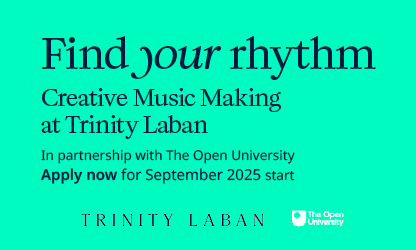A conversation with Zelkova Quartet, winners of the St Martin's competition
Zelkova Quartet won the 2017 St Martin's Chamber Music Competition with a fantastic rendition of string quartets by Haydn and Debussy. They are now available to hire by Making Music member groups for a fixed affordable fee (find out how to book them).
The quartet was founded at the Royal Northern College of Music in 2010 by first violin Caroline Pether and her friend Simmy Singh. "We had a similar passion for prioritising storytelling and we agreed that chamber music was a wonderful way to achieve this," explains Caroline. After several personnel changes, it is now formed by Caroline as the first violin, her siblings Ed Pether in the second violin and Jonathan Pether in the cello, and fellow RNCM alumni Alex Mitchell in the viola.
Is sharing a Quartet amongst siblings easier or more challenging?
Ed Pether: In many ways it's very natural playing with family members; it's easier to be direct with each other when we've known each other our whole lives. We haven't felt that it's interfered with our relationships as siblings and hopefully it will continue that way! And I'd played in other chamber groups with Alex for several years before we joined the Zelkova so I have a similar familiarity with him.
A Zelkova is a tree. What does the Quartet have in common with it besides the name?
Caroline Pether: I must confess that when choosing the name we didn't know much about the Zelkova tree, we just loved the way the word sounded! But over the years I have found out more and realised there are a number of interesting parallels to draw. Firstly the tree varies enormously in appearance depending on its species; it varies in size from shrub to 30m tall. It has also made many parts of the world its home; originally the Zelkova tree was common throughout Northern Europe and North America but it can now be found in parts of Southern Europe and Eastern Asia. We like to think that its variety can be applied very easily to our own approach to the music we play. The string quartet repertoire is very rich, yields huge rewards and to do each work justice we aspire to discover that composer's unique language, which is often strongly influenced by their country of origin. We try to find completely different sound worlds, characters and colours to communicate that great diversity.
How would you describe your Quartet?
Alex Mitchell: We enjoy transmitting our energy and enthusiasm for this music to our audiences. We like to work hard in all aspects of music making and are always trying to find ways to develop and progress as an ensemble. We're all good friends outside the quartet environment and I believe this is reflected in the way we make music.
And how would you describe a perfect performance?
Jonathan Pether: The idea of achieving perfection can sometimes be unhelpful in the moment of performance. The mind starts to give undue prominence to technical matters, for example, which leads to too much focus on oneself as an individual rather than the group’s overall performance. This usually blocks the creative and communicative process in performance. Of course the way we work outside the concert hall is absolutely with a perfect performance in mind, not only with technical matters but also in relation to how best to bring the notation to life. We push ourselves in this environment but with the knowledge that ‘perfection’ is near unachievable. It shouldn’t stop musicians trying though!
What can promoters and audiences expect from your performances?
AM: We hope that a mutual feeling of excitement and love of music making is achieved between the audience and us in concerts, that feeling of being truly in the moment.
JP: As Caroline said earlier, we should aspire to be storytellers, bringing people on a journey through music both familiar and unfamiliar. We also enjoy sharing bits of information about the music to our audiences before the performance, which could be a particular aspect of the piece which we enjoy bringing to life, as well as the background behind it. We feel it’s important to have this verbal dialogue between ourselves and the audience.
How do you get audiences to become interested in more contemporary repertoire?
EP: It sometimes a challenge to persuade audiences that contemporary music can be accessible and moving. It's strange that composers often carry a stigma simply for being alive! What we and many others often do is programme contemporary music with more established repertoire, which is a bigger sell. Then audiences often find to their surprise that they enjoy the contemporary piece too.
JP: We enjoy playing music that speaks to the heart in its gestures, whether it was composed in the eighteenth or twenty-first centuries. If those gestures exist in a composition then it’s our job to elevate them and make them comprehensible and relatable. This is the biggest challenge in much contemporary music but it’s one that is very rewarding.
Research suggests classical audiences are getting older. What do you do to attract and develop new and younger audiences?
JP: We shouldn’t shy away from the idea that chamber music in particular is a form that tends to appeal to people later in life. Having said that there’s no reason why it can’t appeal to younger people – one of our favourite concerts that we play is a charity series in a Manchester pub organised by our friends at the Eblana Trio. There’s always such a diverse crowd there and it’s amazing and enlightening to hear from audience members that have never experienced the power of live classical music before, especially in an intimate environment like that. The challenge is usually hooking people in, and perhaps the conventional concert hall experience is partly responsible. We should always look for interesting ways of presenting our art.



